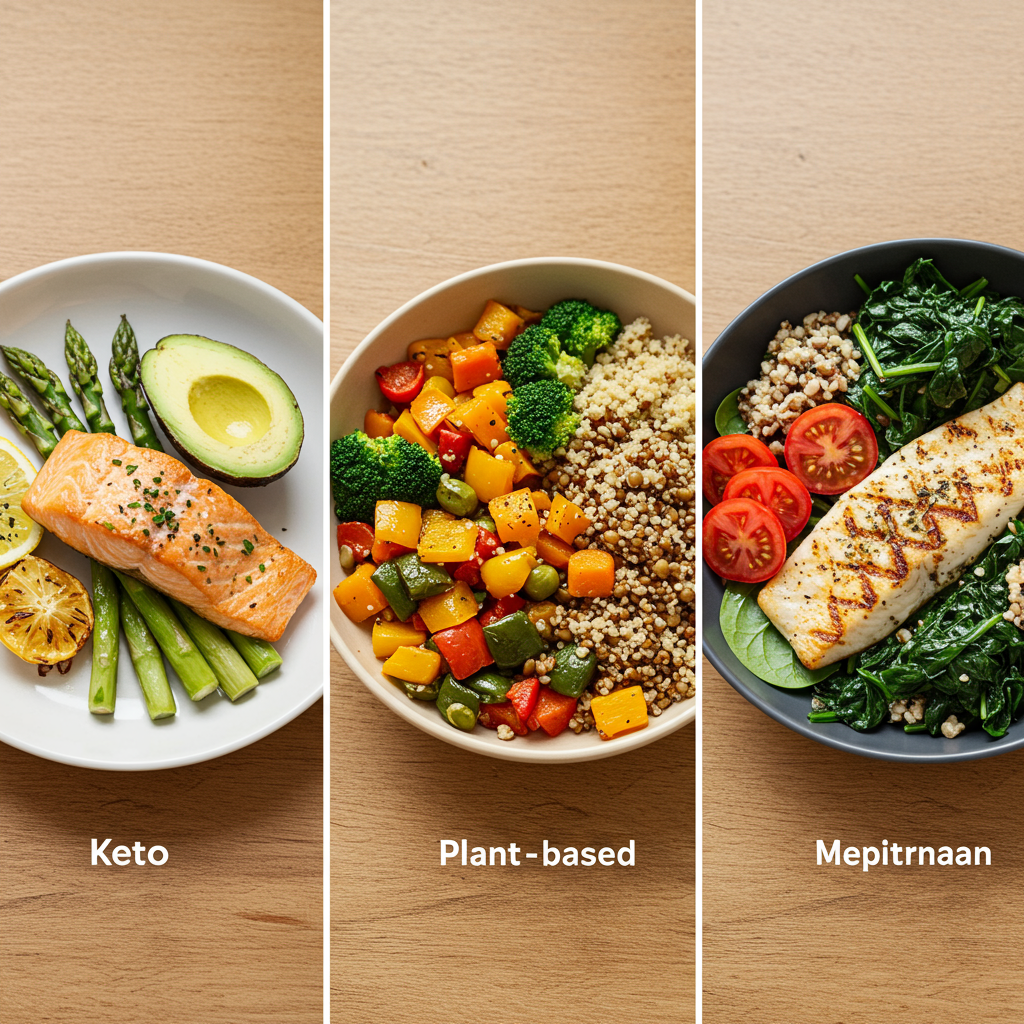Finding Your Optimal Blood Sugar Diet: Comparing Keto, Plant-Based, and Mediterranean Approaches
Are you confused about the best dietary approach for managing blood sugar? You're not alone. With countless "miracle diets" promising to reverse diabetes and normalize glucose levels, it's challenging to separate fact from fiction. As someone who has spent decades working with patients with metabolic conditions, I believe there's no one-size-fits-all solution, but there are evidence-based approaches worth exploring. Let's dive into three popular dietary patterns and uncover what might work best for your unique body.
The Problem with Our Current Approach
Before we compare specific diets, let's address the elephant in the room: our conventional approach to diabetes management is failing many people. For decades, we've been told that diabetes is a progressive disease requiring more and more medication over time. But what if that's not the whole story?
The standard American diet—high in refined carbohydrates, industrial seed oils, and processed foods—drives insulin resistance, the root cause of type 2 diabetes. When we continuously flood our bodies with glucose from processed foods and starches, our cells eventually become numb to insulin's effects. It's like shouting at someone who's wearing noise-canceling headphones—eventually, you have to shout louder and louder to be heard.
The good news? Changing what's on your plate can dramatically alter your metabolic health, often reducing or eliminating the need for medications.

Three Evidence-Based Dietary Approaches
The Ketogenic Diet: Metabolic Reset
The ketogenic diet limits carbohydrates to approximately 20-50 grams daily, replacing them with healthy fats and moderate protein. This approach essentially bypasses the broken glucose metabolism pathway, allowing your body to run primarily on ketones (derived from fat) rather than glucose.
Pros for Blood Sugar Management:
- Produces rapid and significant reductions in blood glucose and insulin levels
- May reduce or eliminate medication needs quickly
- Powerful weight loss effects, particularly visceral fat reduction
- Reduces hunger and food cravings by stabilizing blood sugar
Considerations:
- Requires significant dietary change that may be challenging to maintain long-term
- Needs careful monitoring if you're on diabetes medications to prevent hypoglycemia
- Quality matters—focus on whole foods, not just counting carbs
Plant-Based Approaches: Nutrient Density and Fiber
A whole-food, plant-based diet emphasizes vegetables, fruits, legumes, nuts, seeds, and whole grains while minimizing or eliminating animal products.
Pros for Blood Sugar Management:
- Rich in fiber, which slows glucose absorption
- Provides powerful phytonutrients that combat inflammation
- Associated with improved insulin sensitivity
- Supports a healthy gut microbiome, increasingly linked to metabolic health
Considerations:
- High-carbohydrate plant foods may need careful portion control
- May need supplementation (B12, omega-3s, etc.)
- Some people experience blood sugar spikes with certain plant foods like grains or tropical fruits
The Mediterranean Diet: The Best of Both Worlds?
The Mediterranean pattern emphasizes olive oil, vegetables, fruits, fish, nuts, seeds, and moderate amounts of whole grains, with limited dairy and red meat.
Pros for Blood Sugar Management:
- Combines the anti-inflammatory benefits of plant foods with blood sugar-stabilizing proteins and fats
- Has the strongest long-term research supporting metabolic health
- Highly sustainable and enjoyable for many people
- Focuses on whole, unprocessed foods without extreme restrictions
Considerations:
- Less rapid results than keto for those needing immediate blood sugar improvement
- Traditional Mediterranean diets are lower in processed foods than many modern interpretations

Personalization: The Missing Piece
Here's what's often missing from diet debates: your unique response to foods. Two people can eat the same meal and have dramatically different glucose responses. Factors like sleep quality, stress levels, gut microbiome composition, and genetics all influence how your body processes different foods.
Instead of adhering rigidly to a specific diet label, consider these principles:
-
Test to assess: Use a continuous glucose monitor or regular testing to see how different foods affect your blood sugar.
-
Focus on food quality first: Regardless of your dietary pattern, eliminating ultra-processed foods dramatically improves metabolic health.
-
Consider your personal context: Your cultural background, food preferences, cooking skills, and lifestyle all matter for sustainability.
-
Start with a reset: For those with significant insulin resistance, beginning with a stricter approach like keto can break the cycle of sugar cravings and insulin spikes, making transition to a sustainable long-term pattern easier.

The best diet for your blood sugar is one that keeps your glucose stable, reduces inflammation, provides essential nutrients, and—crucially—one you can actually maintain. For many of my patients, this ends up being a personalized approach that borrows elements from all three patterns: abundant non-starchy vegetables, high-quality proteins, healthy fats, and limited refined carbohydrates.
Remember, food is information, not just calories. Each bite sends instructions to your genes, hormones, immune system, and microbiome. Choose wisely, and your body will respond accordingly.
References:
Athinarayanan, S.J., Adams, R.N., Hallberg, S.J. et al. Long-term effects of a novel continuous remote care intervention including nutritional ketosis for the management of type 2 diabetes: A 2-year non-randomized clinical trial. Front Endocrinol. 2019;10:348.
Esposito, K., Maiorino, M.I., Bellastella, G. et al. A journey into a Mediterranean diet and type 2 diabetes: a systematic review with meta-analyses. BMJ Open. 2015;5(8):e008222.






